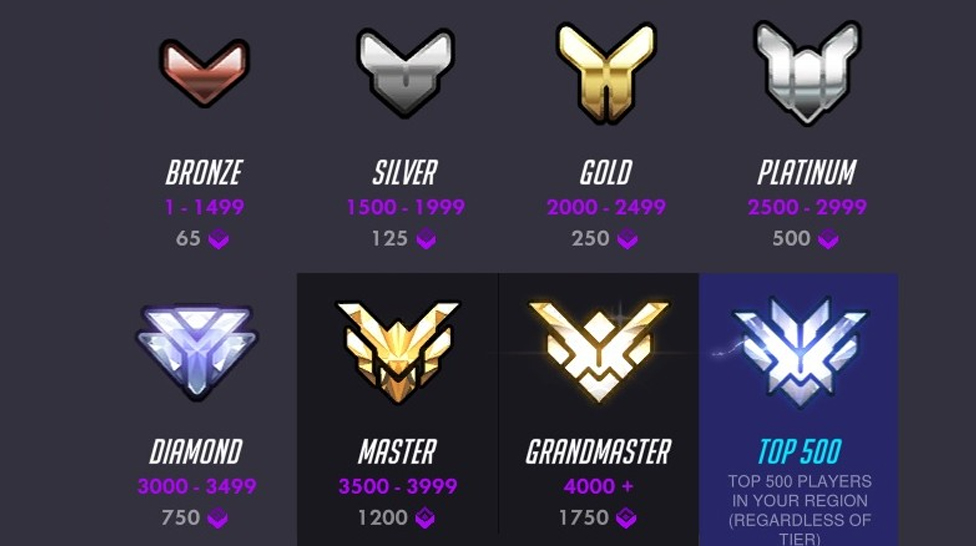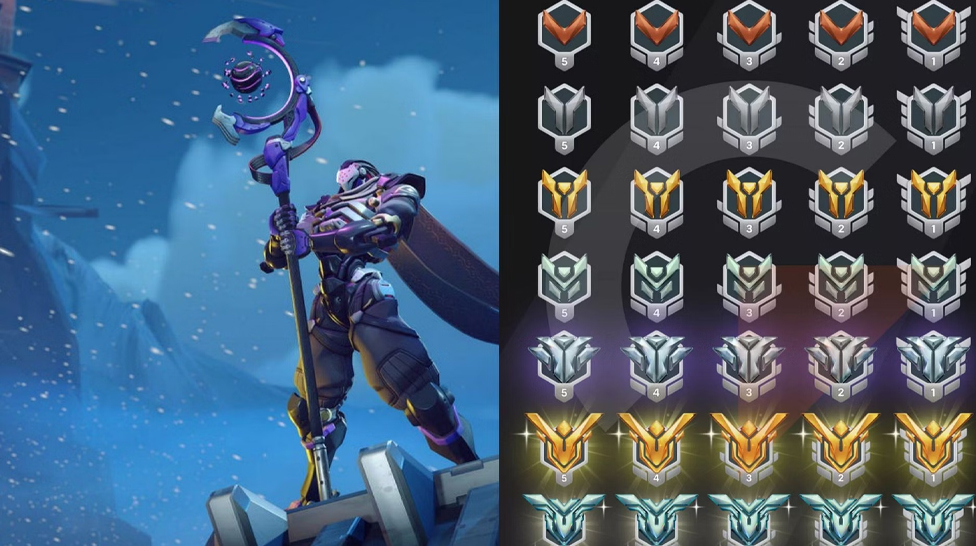What you need to understand about the Overwatch ranking system is this. The Overwatch rankings function as follows, along with the number of ranks and rules that apply to the SR scores that determine your ranking.
OVERWATCH RANKING SYSTEM
The SR, or skill rating, is the foundation of the Overwatch Ranking System. Your position in the ranking system is determined by this score. It divides players into several levels based on how well they perform. By accumulating more SR, you may move up or down in the rankings. The complete Overwatch rankings are as follows:
-
Bronze – 1-1,499 SR
-
Silver – 1,500 – 1,999 SR
-
Gold – 2,000 – 2,499 SR
-
Platinum – 2,500 – 2,999 SR
-
Diamond – 3,000 – 3,499 SR
-
Master – 3,500 – 3,999 SR
-
Grandmaster – 4,000+ SR
-
Top 500 – Top 500 players in region
The majority of the Overwatch rankings system's tiers are straightforward, however the Top 500 is a little trickier. This is more of a title or accomplishment than a certain rank. Matches between the top 500 players occur often in Grandmasters and sometimes even in Masters. As Overwatch's matchmaking issues and wait times have become worse, this has only gotten worse. Instead of thinking of it as a precise rank that you enter, it is preferable to think of it as the best players. However, the majority of the players you see in Overwatch competitions are definitely top 500 level!
The fact that the Overwatch ranks don't all have the same size is also important to note. The majority of gamers fall into the Silver, Gold, and Platinum levels. These are the easiest ranks to matchmake into, but they are also the most difficult to advance out of. These days, not many games use this method for rankings, but Overwatch does.
SR IN OVERWATCH RANKING SYSTEM
In Overwatch, your fundamental ranking score, or SR, determines where you place. Unless you're utilizing Open Queue, each role you play will result in a different SR rating. You begin with introductory games when you initially sign up to acquire your SR score. These games evaluate your performance and skill level, and based on how they turn out, they give you a beginning rank and SR. Even while your first Overwatch competition rating often doesn't seem fair, you have no control over it.
Depending on the amount of SR you get after this, you may either advance or descend the levels. Your SR and rank each season will be impacted by your performance in games, wins, and losses.
WHAT EFFECTS SR IN THE RANKING?
The Overwatch rankings system is mostly based on SR, but how is it calculated? The precise formulas used to calculate your SR are presently unknown. This could be bothersome since it sometimes seems to be moving arbitrarily.
Depending on the game they are in, different players seem to gain or lose at varying rates. There are several alternatives to consider. Along with the numerous scores you may look at for your personal performance, there are other elements like the standings of your teammates and opponents. Essentially, we are unable to provide precise figures. It obviously varies based on elements related to how well you play, but specific figures won't be given.
When you pick up more victories than losses, you are rewarded more SR. When you win a match, you often don't necessarily see a rise in value that is consistent with regular growth. However, it is plain that victories are superior. If you can rescue one of those elusive ties from the jaws of loss, bear in mind that draws don't seem to influence your ranking either.
REWARDS IN OVERWATCH RANKING SYSTEM
You get incentives via the Overwatch ranking system in addition to bragging rights. You earn CP by participating in Overwatch competitions every season. This is given after each victory and varies in value according on your Overwatch competitive level. Golden weapons and other goodies like sprays and icons may be obtained by exchanging CP. These enable you to display your rank via in-game cosmetics.
The Overwatch rankings system operates in exactly this manner. Even while it's simple to keep track of them, moving forward might be challenging. You must consistently demonstrate that you are among the game's best players if you want to move up the rankings. Due to the enjoyable SR system, even the top Overwatch players still need to grind their way up to that level.
CS2 Gambling
CS2 Skin Trading
Rust Gambling
Promo Codes
Online Casinos
Crypto Casinos
CyberSport Feed








![What Are the 7 Cheapest Rust Skins in [year]? What Are the 7 Cheapest Rust Skins in [year]?](/imgs/news_8187/20250409/cache/1744206220_d907ec12798167979171___308_174.jpg)
![Top 5 CS2 Cheats in [year] Top 5 CS2 Cheats in [year]](/imgs/news_8003/20241107/cache/1730975319_fad9f983f190c7d75fc0___308_174.jpg)
![Top 10 CS2 Workshop Maps in [year] Top 10 CS2 Workshop Maps in [year]](/imgs/news_8014/20241111/cache/1731319844_c89c5afb43f4ce03d1b3___308_174.jpg)
